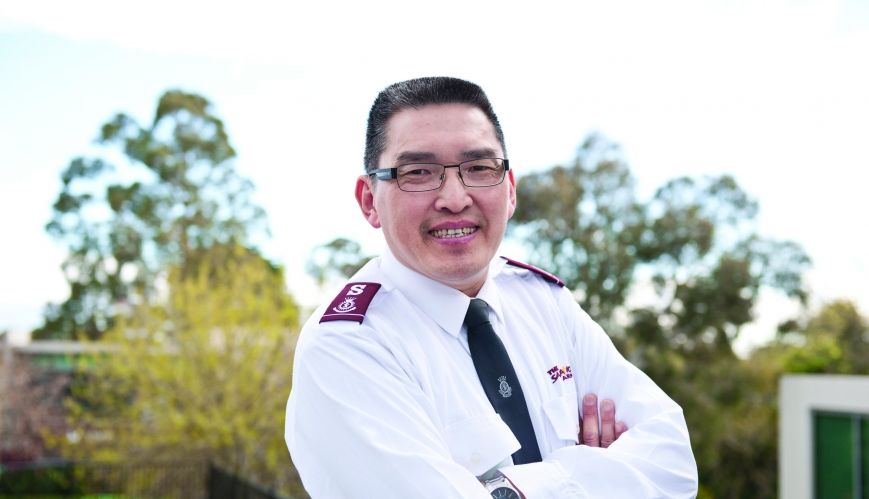Australian advocates keep General Eva's 'political' torch aflame

Australian advocates keep General Eva's 'political' torch aflame
5 December 2016
Lieutenant-Colonel Samuel Pho is The Salvation Army Australia's National Secretary.
It was Australia’s Eva Burrows who best articulated The Salvation Army’s stance on political issues when she was elected as the organisation’s world leader in 1986.
Upon being asked, “What will be your position on political issues?”, the newly-elected General Burrows responded: “While I definitely feel that the Army should have no partisan bias, I believe we should feel strongly about social injustice. If political means speaking out on issues such as abortion, poverty or homelessness, if political means speaking out to quicken the conscience of the government on the needs of the people, then I’m political”.
Taking up this charge going into 2017, as The Salvation Army’s two territories in Australia unite, is National Secretary, Lieutenant-Colonel Samuel Pho, and Territorial Social Justice Coordinator, Casey O’Brien Machado.
Lieut-Colonel Pho represents The Salvation Army in Canberra. He builds networks with federal politicians, which he sees as building relationships with trust and mutual respect. “The Salvation Army name is well respected at Cabinet level,” he said. “Even in my short time in Canberra I have received calls from ministers’ offices seeking advice or information or wanting to tell me in advance of announcements that they are going to make. I believe though, that real change happens when all groups – public, private, secular, religious – work together to achieve a common goal. Every Salvationist definitely has a role ... we are to be salt and light in the world.
“The purpose of the church is not to be socially agreeable, it is to speak robustly to the state on behalf of those who cannot speak politically for themselves; and I have the privilege to take part in this. My primary function is building and maintaining good relationships with politicians on behalf of The Salvation Army and being an advocate for our policies – being a representative voice for the poor and the marginalised”.
Casey agrees that, as citizens of both the Kingdom of God and also of Australia, of the place in which we live; that we can’t avoid politics. “It’s not a matter of whether we should or shouldn’t be on the side of the marginalised or whether we should or we shouldn’t be advocating for others,” she explained. “It’s a matter of how we do that. Ken Wytsma [author, social entrepreneur, educator] said, ‘Even when Christians agree on the end of biblical justice that protects the vulnerable and allows for shalom, there is still the question of how that end is best achieved.
“There is a common belief that The Salvation Army is non-political,” Casey continues. “This is incorrect. The Salvation Army is not party-political, but it is certainly political! It is necessary for The Salvation Army to engage with politics to ensure that it plays its part in bringing the world it wants to see. If we’re engaged with the world around us, if we care that the world looks like the Kingdom of God, we will naturally be political, and engaged in the political sphere. Furthermore, we have a responsibility as individual Salvationists to engage with politics. It’s necessary for those who are a part of The Salvation Army to play their part in bringing about the world that they want to see. Our priority in our engagement with politics, rather than choosing a party to side with, is being sure that we’re informed as individuals and therefore that what we’re saying and supporting is biblical, is holy, and is bringing the Kingdom of God to earth.”
As individuals and Salvationists, Casey believes that we have a huge responsibility to know what’s going on in the political and government arena and to engage local, state and federal members to help bring about the world we want to see.
“If as individuals we don’t even notice the things that are going on in government, the greater ‘Salvation Army’ is not going to, because The Salvation Army is made up of us – as individuals – and sometimes we need to raise the attention of the rest of the organisation to ensure that it advocates for or against certain things,” she explained.
Lieut-Colonel Pho and Casey shared many of these ideals in September at the Salvo Academy forum at Stanmore House, Sydney, where they were guest speakers. Participants were encouraged to explore what the Army is doing at both a local and national level, and discover what it means for us as individuals to be engaged with the world around us.
Delegates asked many questions around when they represent The Salvation Army and when they don’t; how to engage with politics and politicians; how to know which political issues the Army is currently involved with; how to access Salvation Army policies and statements around political issues; and how to advocate against social injustice without ultimately causing a negative impact on the people we serve and the issues and social situations we work with.
“Jesus is our role model for how to advocate against social injustice and bring about the outcome we desire, which is the Kingdom of God on earth,” Casey said. “It’s not about whether we should advocate for the marginalised – it’s how we do it.”
For information on how to engage with politicians, as well as policy statements, additional resources and helpful links, go to the Salvos' Social Justice website.